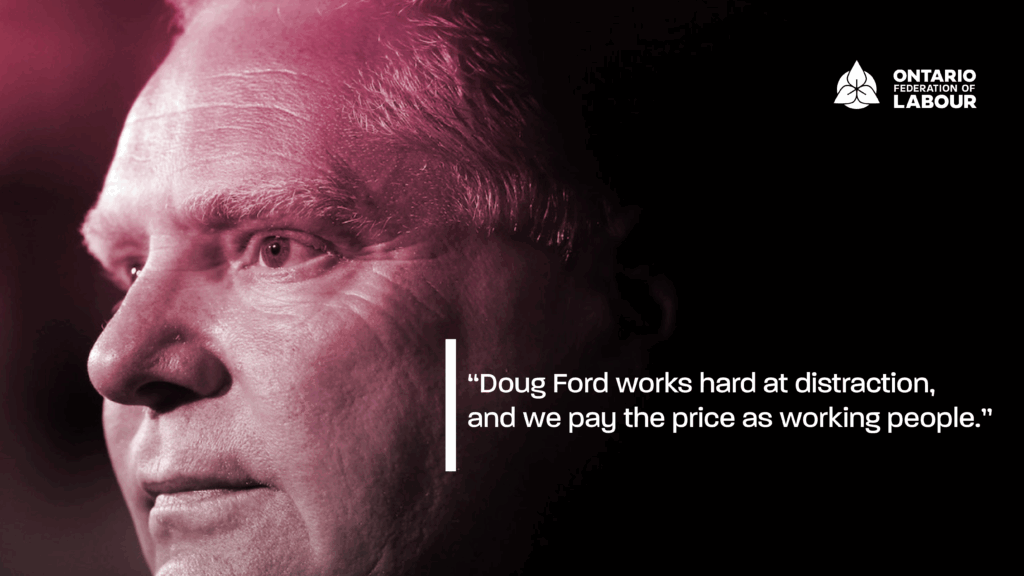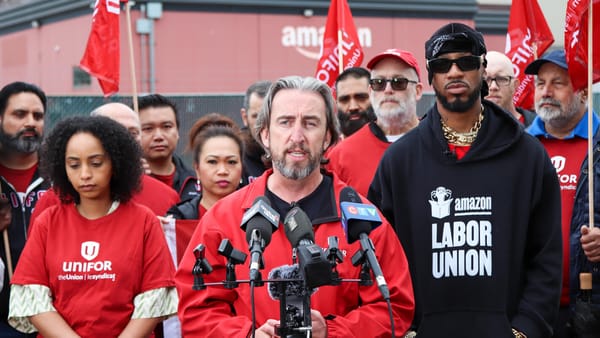
The Ontario Federation of Labour (OFL) is calling out Ontario Premier Doug Ford for failing to enforce the rights of non-union workers.
New data on employment law prosecutions obtained by the OFL and Data Shows (a Substack by journalist Tom Parkin) reveal a dramatic falloff under Ford’s Progressive Conservative government. Between April 2024 and March 2025, only 150 charges were laid against employers for serious violations of the Employment Standards Act (ESA), the legislation that sets minimum conditions of employment for workers across the province.
These 150 prosecutions are markedly lower than the more than 1,500 charges levelled in 2015 under the previous Ontario Liberal government. In 2020, the number of prosecutions was even lower, at just 56.
What’s more, 37 of the 150 charges laid last year (25 per cent) were withdrawn because of court backlogs and other processing delays. (According to the Supreme Court of Canada’s Jordan limits, criminal cases in provincial courts must be tried within 18 months or be dropped.)
According to Data Shows’ figures, prosecutions of employers for occupational health and safety (OHS) violations have also dropped considerably over the past several years under the Conservatives.
Whereas 3,527 charges were laid in the Ontario Court of Justice in 2016 under the previous government, only 1,622 charges were brought forward from April 2024 to March 2025. Though charges are up slightly over the previous two years, they are down considerably from a decade ago. In 2020, just 1,343 OHS charges were laid.
“While Doug Ford extends his summer with ice cream bar press conferences instead of sitting in the legislature, workers are paying the price with gutted court enforcement of their basic employment rights,” the OFL said in a press release.
In practice, these lack of prosecutions mean workers who have experienced significant employment law violations are being denied justice, while law-breaking employers get off scot-free.
As OFL president Laura Walton told Class Struggle, “Because this government and the courts aren’t enforcing the law, they’re rewarding employers for bad behaviour and in fact punishing the workers who keep our economy going.”
That OHS prosecutions remain higher than those under the ESA reflects the seriousness of former violations. When employers fail to maintain safe workplaces, they in many cases literally risk the lives and limbs of workers. Nevertheless, ESA violations can also cause significant harm to workers, particularly when it comes to the non-payment of wages.
In Ontario, the ESA sets the minimum conditions of employment for workers by establishing rules concerning the minimum wage and overtime, hours of work, vacation and holiday pay, severance and termination, and various job-protected leaves. For workers without a union or not covered by a collective agreement — roughly 74 per cent of Ontario workers in 2024 — the ESA is their only source of protection.
A mountain of research across jurisdictions demonstrates that employers routinely violate employment standards laws.
Government agencies tasked with enforcing employment laws are also notoriously understaffed and underfunded, and thus fail to adequately address the problem of widespread employer non-compliance with the law.
Part of the problem is that labour enforcement agencies, such as the Ontario Ministry of Labour, mostly rely on workers reporting violations to them, rather than proactively investigating employers. Of course, workers in vulnerable situations may fear employer reprisal and never come forward when their rights have been transgressed. Consequently, workers who are the most likely to experience violations are often the least likely to lodge complaints.
Unsurprisingly, then, official “complaints” massively undercount employment violations. Research from the United States estimates that for every one complaint lodged there are 130 violations of workers’ rights.
As Walton put it with respect to the recent Ontario data: “These are just the workers who were brave enough to make a complaint. We know way more workers out there are experiencing these things and either they don’t know that they’re violations, they’re scared to complain, or their employer puts pressure on them not to.”
How government agencies deal with the complaints they do receive is also problematic.
Ministries of labour and other equivalent agencies typically operate according to what’s known as a “compliance model of enforcement,” which falsely assumes that employers violate workers’ rights out of ignorance rather than wilful intention.
A compliance orientation thus aims to correct employer wrongdoing through education, persuasion and other ‘light-touch’ methods of enforcement, and only escalates to punishments such as prosecutions in the most egregious of cases.
In fact, it’s common for harsher punishments to occur only when employers fail to comply with government orders to correct previous violations. In this sense, snubbing the government agency elicits a firmer response than violating workers’ rights.
Where employers are found to be in non-compliance, initial penalties often amount to little more than directives to correct their behaviour. For example, previous research from Ontario finds that failure to pay wages, vacation, holiday or overtime pay typically results in “orders to pay” what is owed and nothing more.
Where employers are caught and issued “orders to pay,” they frequently refuse to pay workers what they’re rightfully owed. When this occurs, the Ontario Ministry of Labour, like many employment law agencies, lacks the enforcement capacity to collect workers’ money. Orders to pay can be filed in court, but even then, employers may close their business and open it under a new name or find some other way to evade the law.
Employers are perhaps the only class of people in society who can steal from others and, if caught, expect no punishment other than simply having to give back what’s been taken. As critics point out, the entire enforcement regime hardly deters employment violations. Given the low likelihood of being caught, and the many avenues for evasion, it may in fact promote employer law-breaking.
Bear in mind, all of the steps outlined above precede court prosecutions — the focus of the OFL and Data Shows’ release. Prosecutions are saved for the most offensive cases involving the most recalcitrant employers and are thus exceedingly rare to begin with.
In other words, the dramatic drop in prosecutions is likely just the tip of the iceberg. From top to bottom, governments, including Ford’s, willingly fail to protect the rights of non-union workers and allow employers to break the law routinely and systematically. “Enforcement is not happening to the extent it should and it tells employers that they can get away with it,” Walton told Class Struggle.
All of this underlines the degree to which the Ford government’s legislative agenda, branded as “working for workers,” is a sham. “With this government, it’s clear that actual workers aren’t their priority and neither is enforcing the laws that are put in place to protect them,” Walton said.
Were workers a real priority for the Ford government, enforcing the laws that exist would be first on the agenda. Instead, employers are getting a handout in the form of unenforced laws and non-prosecutions.
Moreover, any government serious about improving workers’ rights would be facilitating unionization.
As Walton emphasized to Class Struggle, the primary way to protect workers’ rights on the job is to facilitate access to unionization.
As she put it, unions enable workers to fight employer wrongdoing together rather than rely on an underfunded government ministry to do it. “Having a union in the workplace helps workers get what they need and fight back against these bad bosses.”
Recent Class Struggle Issues
- October 6 | The Minimum Wage Increase In 5 Provinces Isn’t Enough
- September 29 | Canada Post’s Moment Of Reckoning May Finally Be Here
- September 22 | Unions Improve Social Well-Being Even For Non-Members
- September 15 | Air Canada Flight Attendants Overwhelmingly Reject Wage Proposal







